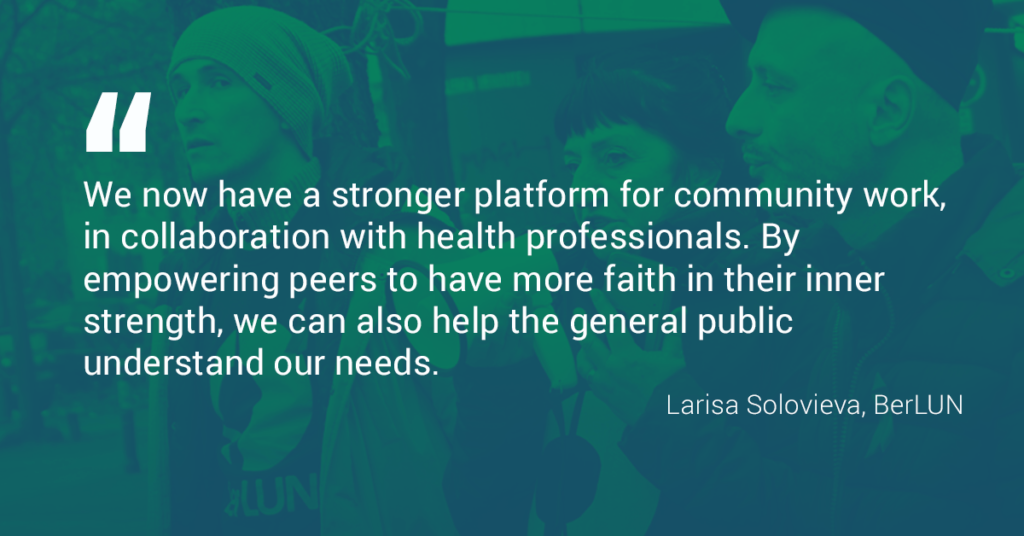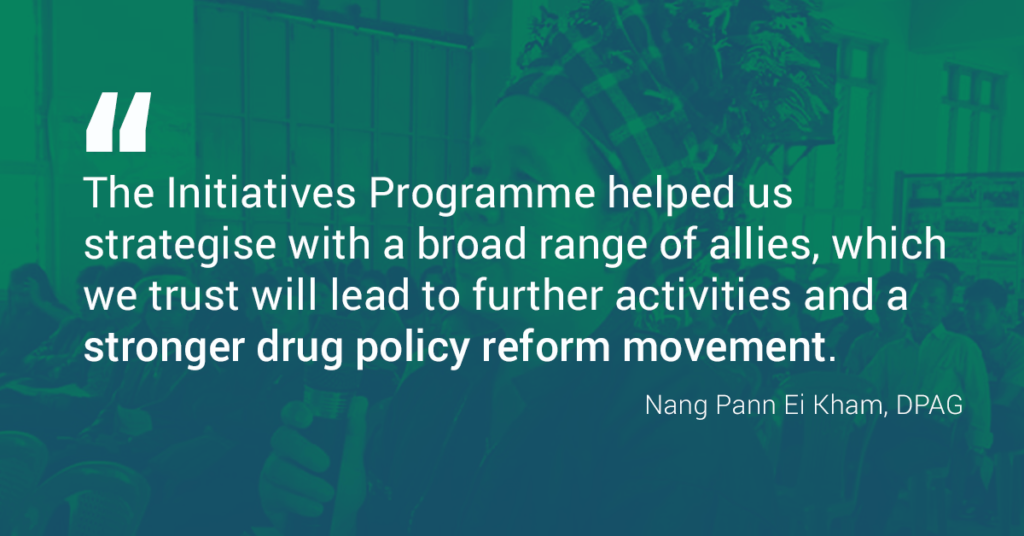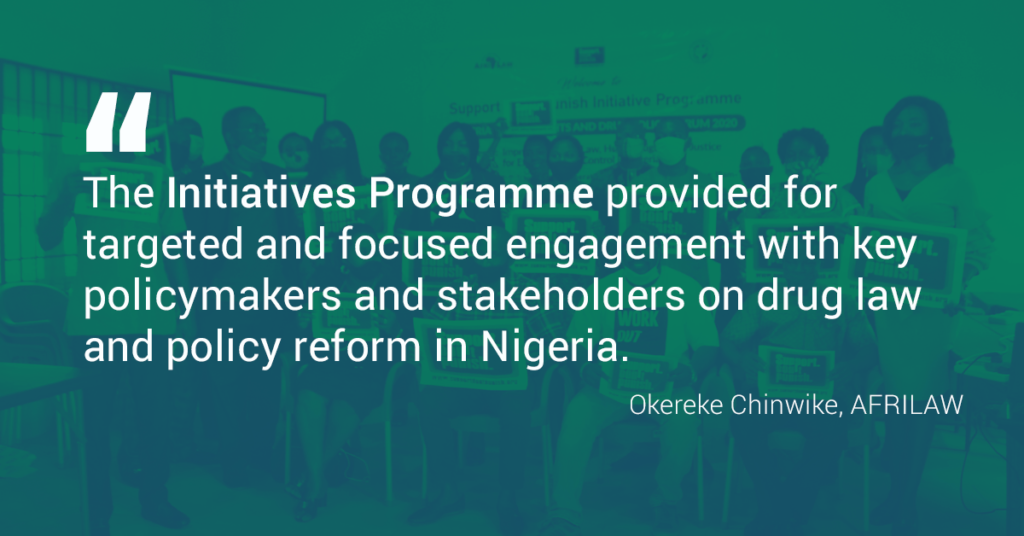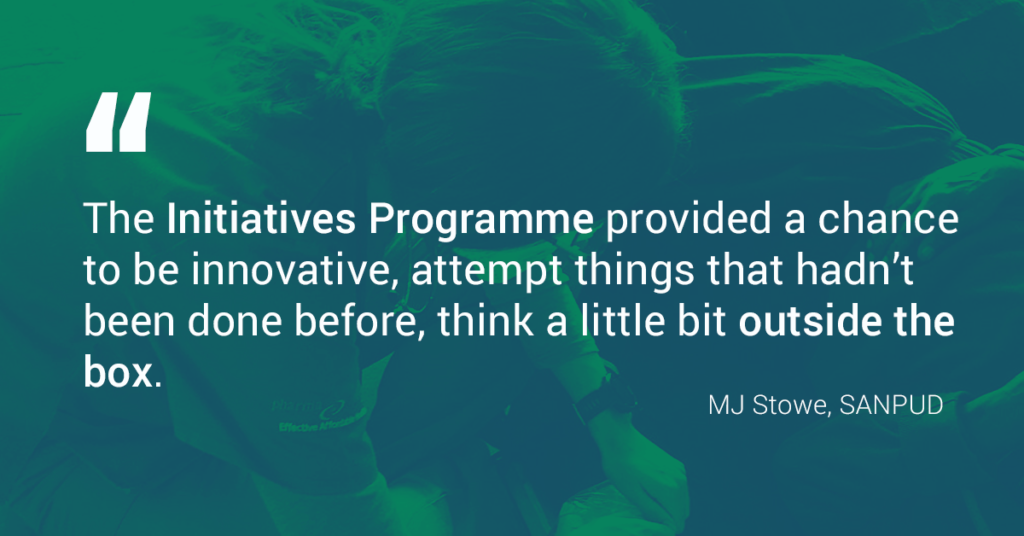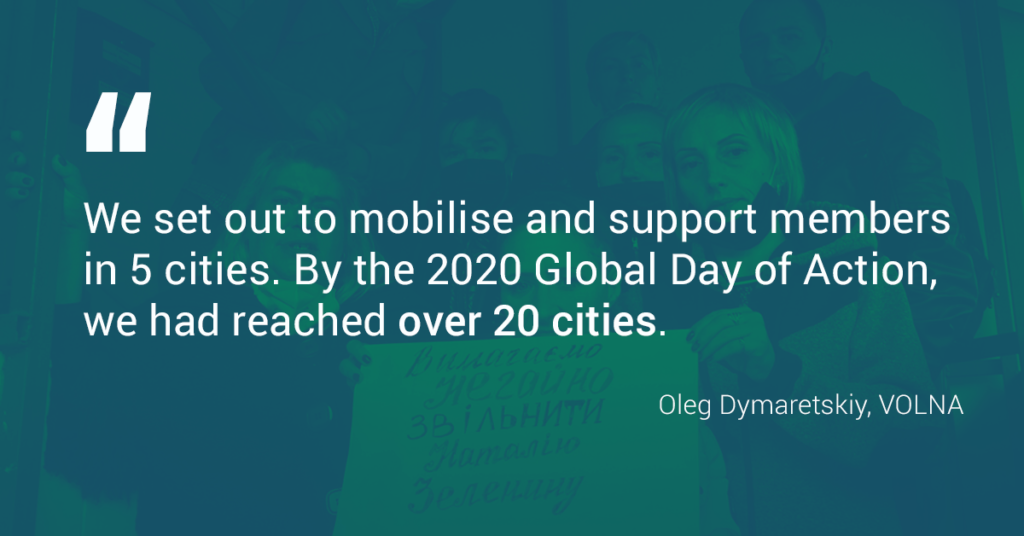The Initiatives Programme‘s first cohort was selected from an incredibly competitive process. The Call for applications, launched in September 2019, received 82 responses of a very high calibre. Applications were assessed by IDPC as well as a group of Support. Don’t Punish campaigners and community representatives from across the world. Six projects, from Argentina, Germany, Myanmar, Nigeria, South Africa and Ukraine, involving four community-led networks, were selected on the basis of their coherent strategy, creativity and collaborative nature.
We’re incredibly grateful to the Elton John AIDS Foundation for their steadfast commitment to harm reduction and belief in the power of community mobilisation. The Initiatives Programme is possible thanks to EJAF’s invaluable support.
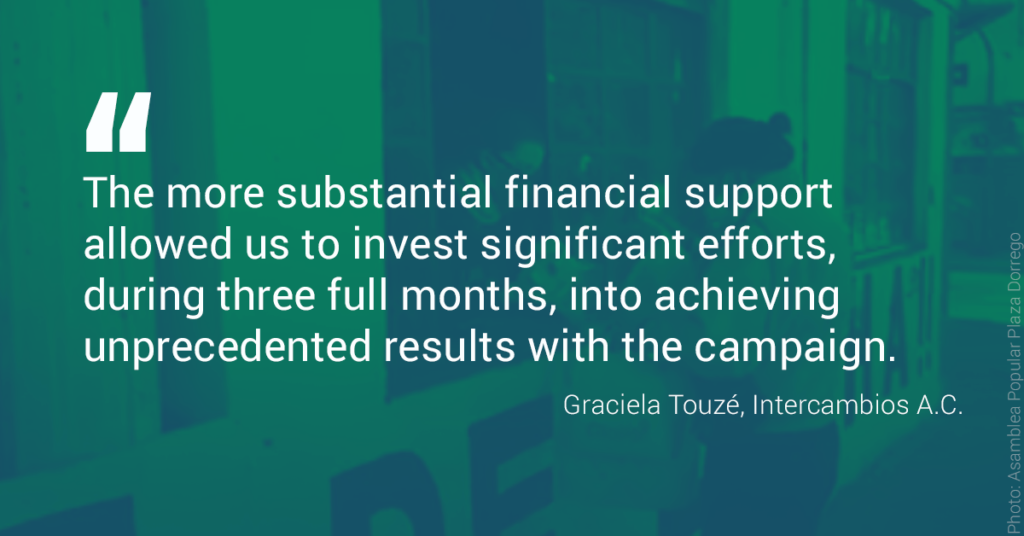
Argentina | Led by Intercambios A.C.
Intercambios A.C. is a civil society organisation that aims to develop and apply knowledge in addressing drug-related challenges, within the framework of human rights.
To adapt to the constraints of the pandemic, Intercambios joined efforts with over 70 organisations (including local governmental departments) in 21 cities of 11 provinces in Argentina. Together, they promoted, with one voice, a common message: #EstarEnLaDistancia (which roughly translates: Being together, whilst distanced).
The idea behind this shared campaign message was to ensure that physical distancing measures would not negatively impact in the rights of people in situations of vulnerability. In times of ‘retreat’, Intercambios promoted redoubled efforts to ensure access to goods and services, particularly for sex workers, people who use drugs, trans people, street-based people and young people from deprived areas.
The message also sounded the alarm around the difference between a much-needed caring response during the pandemic, and measures that sought to punish and repress already stigmatised populations due to their situation of precarity and incapacity to follow the lockdown mandate as a result of viable livelihoods.
Through the Initiatives Programme, social media cards were produced with key information on right-affirming responses to the pandemic situation. Videos were shared by the different participating organisations to share how they were contributing to this national, collective effort. Finally, a common declaration on drug policy reform, harm reduction and the COVID-19 crisis was shared and signed by 133 organisations and people.
Intercambios was particularly proud of: the national reach of this #SupportDontPunish campaign; the increase in the number and thematic scope of organisations joining activities; the increase in awareness by different organisations and collectives of the importance of reforming drug policies to promote everyone’s health and well-being; stronger bonds of solidarity between peer-led organisations and allies; and the campaign partners’ capacity to adequately mobilise in response to the risks associated with the pandemic situation.
Germany | Led by BerLun
BerLun is a community-led network of Russian-speaking people who use drugs in Berlin.
BerLUN’s initiative sought to raise support for the need to humanise drug policy, ofefr support and refuse punishment. BerLUN’s initiative also called for improved access to drug dependence treatment and other health provisions for people who use drugs, especially for those living and vulnerable to HIV and other conditions.
Five different activities were organised over the course of seven months under the banner: ‘One Europe: Access to treatment for everyone!’. These included:
- World AIDS Day rally: Through whcih BerLUN collaborated with local partners to underscore the importance of drug policy reform in ending the HIV, and all, pandemics. In the words of Larisa: ‘We cannot end HIV without humanising drug policy’.
- Community work on HIV Prevention: Every Saturday, from January to May 2020, BerLUN hosted community gatherings to discuss the needs and challenges of peers, opportunities for training, upcoming events and the organisation of outreach work. Once the COVID-19 pandemic hit, BerLUN moved to virtual spaces on Zoom. Partnering with Deutsche Aidshilfe and Berliner Aids-Hilfe, BerLUN also organised a discussion event with social work students, to raise awareness and develop their capacity to address the challenges faced by people who use drugs who are also migrants and are persecuted. This event was considered incredibly enriching and BerLUN will seek to continue this experience in the future. All in all, these community events have been incredibly empowering and shone a light on the fundamental value of community mutual aid.
- Street reporters blog: Initially, BerLUN’s initiative would have included a photo exhibition. With the pandemic restrictions, this strand of the project was turned into a video channel on the lives of people who use drugs under the COVID-19 situation. By summer 2020, over 500 people had subscribed to the channel. BerLUN also mobilised within the initiative to raise and pair donations of SIM cards and mobile phones with peers in need, to ensure access to communications and the Internet in these difficult times.
- 2020 Global Day of Action: The BerLUN community, partners, students and Berliners joined a gathering with colleagues from Deutsche Aidshilfe, Berliner Aids-Hilfe, Fixpunkt, JES and others. This was an occasion to celebrate BerLUN’s 3rd birthday, with a dinner to which all guests were invited.
- Finally, on 21 July, BerLUN commemorated International Drug Users Remembrance Day 2020 with a gathering and speeches to those in attendance.
BerLUN was particularly proud of their capacity to build power within the community, and empower peers to share their experiences in ways that are enriching to others. For them, the key value of the Initiatives Programme concerned the possibility of coming up with more ambitious workplans, working with a broad range of partners (including bloggers and journalists) and build coalitions with like-minded organisations to strengthen a common front for people-centred drug policy.
Myanmar | Led by the Drug Policy Action Group (DPAG)
The Drug Policy Advocacy Group is a discussion platform composed of a wide range of stakeholders with an interest in drug-related policies and practices. The group’s main objective is to advocate for the adoption of drugs policies and practices based on public health, human rights and development.
Despite the challenges associated with mobilising under the restrictions of the COVID-19 pandemic, DPAG was able to create multiple opportunities for government officials, civil society organisations, community groups and allies to rethink harmful drug policies.
Three different online events, on harm reduction, drug policy reform, alternative development and the rights of people who use drugs were organised in collaboration with a range of organisations, including Médecins du Monde, Alliance Myanmar and MYPO.
Campaign materials, including pamphlets, stickers, t-shirts, masks, hand gel and soap were distributed to raise awareness on the importance of harm reduction and the needs of people who use drugs among residents of 7 different cities.
DPAG also organised an online photo campaign, where dozens of different organisations in Myanmar joined with their own Support. Don’t Punish messages whether in Burmese or other languages in the country.
While acknowledging the challenges of liaising with policymakers during the pandemic, DPAG was particularly proud of involving their network’s members and numerous civil society colleagues during the campaign. Shifting the events online also meant DPAG was able to organise events on a broad range of topics, including harm reduction, the rights of people who use drugs, alternative development, the importance of decarceration and prison reform.
Nigeria | Led by YouthRISE Nigeria, the Drug Harm Reduction Advocacy Network (DHRAN) and AFRILAW
This initiative is carried forward by a tripartite partnership. Afrilaw advocates for the rule of law, human rights and justice for all. The Drug Harm Reduction Advocacy Network (DHRAN) is network of activists mobilising for the adoption and expansion of harm reduction services in Nigeria. Youth RISE Nigeria promotes evidence-based drug policy and interventions with the meaningful involvement of young people and most affected communities.
A series of discussion events were organised to develop the capacity of public authorities to respond to the needs of people who use drugs. Peer were part of the organisation and delivery of these events, which targeted HIV, health and law enforcement authorities, shared evidence on harm reduction interventions and the burden of criminalisation on health. A similar event by young people for young people was also organised on social media, and was paralleled by a social media campaign on harm reduction during COVID-19-
Face masks with the Support. Don’t Punish logo were also distributed among people who use drugs and law enforcement authorities.
YouthRISE, DHRAN and AfriLaw were particularly proud of having reached a diverse range of stakeholders (government officials, peers, law enforcement officers, young people), through offline and online means, to advance constructive understandings of drug policy reform and harm reduction.
South Africa | Led by the South African Network of People who Use Drugs (SANPUD)
The South African Network of People who Use Drugs (SANPUD) initially planned for a series of drug checking and naloxone delivery trainings; the production of a photo book with photographies and testimonies of people who use drugs and who live in situations of vulnerability, and a film screening/debate.
SANPUD organised four different activities under the Initiatives Programme:
- Emergency Relief Support for People Who Use Drugs in Distress Under Current COVID-19 Restrictions. SANPUD provided symptomatic medication, personal protective equipment and sanitary products to steret-based people who use drugs that were forced to move to temporary shelters erected by the city. This experience is discussed in further detail here.
- Webinar on the impact of COVID-19 on harm reduction services in South Africa, particularly for street-based people.
- Naloxone administration and overdose prevention trainings (May, June): Hosted with several community-led groups, the training included practical information on how to access naloxone in the country. Healthcare professionals dispenssed naloxone.
- Photovoice project and story-telling event for the Global Day of Action: Together, SANPUD and StreetScapes hosted an event on June 26, 2020 at the house in Woodstock, Cape Town, South Africa. The event consisted of two activities, namely i) the distribution of Support Don’t Punish branded clothing and materials, which was accompanied by discussions around the messaging of Support Don’t Punish; and ii) the exhibition of the photographs taken by those who participated in the Photovoice project. The purpose of the project was to make visible personal stories
SANPUD is particularly proud of the mix of caring, training and creative activities that took place under the Initiatives Programme. Each activity centred the lived experiences and needs of people who use drugs, building power within the community to protect and support each other.
Ukraine | Led by the Ukrainian Network of People who Use Drugs (PUD.UA/ VOLNA)
VOLNA unites people living with drug dependence to provide mutual support, protect and promote the human rights of people who use drugs, and improve their quality of life and access to health programmes.
The Initiatives Programme was translated into 3 different activities by VOLNA:
- Production of film with real life stories of people who use drugs in Ukraine and UN recommendations about drug policy.
- Flash mobs directed at the National Police, the Security Service of Ukraine, the Ministry of Education and Science to demand the freedom of Ukrainian citizens.
- Engagement with policymakers, through health and police departments, in 25 regions of Ukraine.
PUD.UA / VOLNA is particularly proud of having mobilised in support for community members targeted by state violence, as well as becoming involved in discussions around the new national drugs strategy. This engagement is steadily placing decriminalisation in the political agenda as a fundamental component of a public-health-orientated approach to drug policy.
